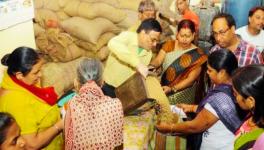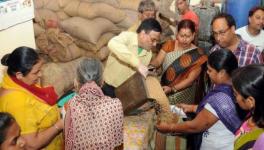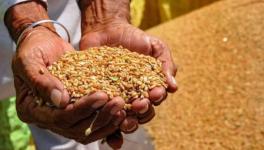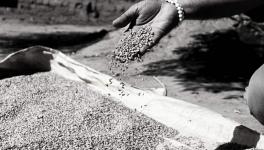Empowering Didis: In MP's Burhanpur, Management of Ration Shops is Boosting Women’s Confidence
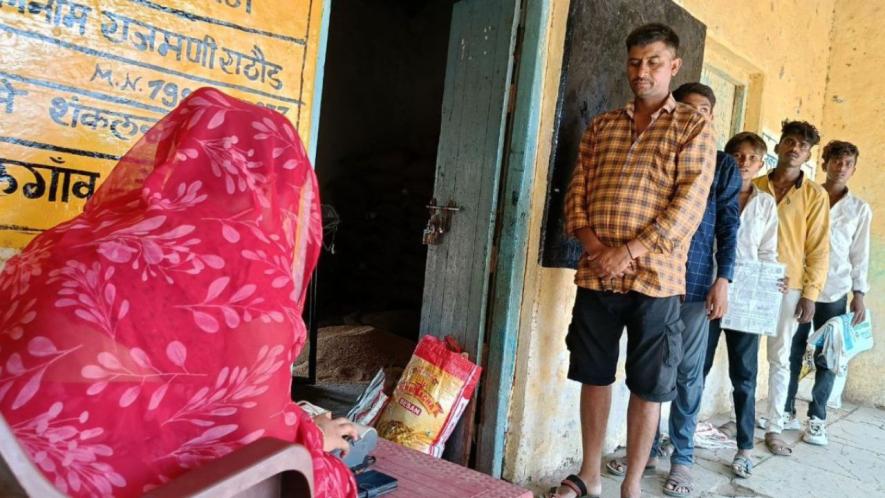
Queue at the ration shop (Photo - Sharik Akhtar Durrani, 101Reporters)
Burhanpur, Madhya Pradesh: "The tradition of ghoonghat (veil) still exists in our society. Women don’t leave their house. But I got the option to step out of this tradition, and now I can feed my family," said Rajmani Rathore (28), from Selgaon village in Madhya Pradesh’s Burhanpur district.
A year ago Rathore was a homemaker. Today, she’s one of 25 didis (elder sisters) in Burhanpur district running local Public Distribution System (PDS) shops. Rathore is part of the Radhekrishna Aajeevika Mission Self-Help Group (SHG), tasked with managing the ration shop in Selgaon, 20 kilometers from the district headquarters.
This initiative is part of a wider effort by the Madhya Pradesh Deendayal Antyodaya Rural Livelihoods Mission and district panchayats in which they are helping rural women form SHGs, open bank accounts, and receive financial assistance and business training based on their interests.
In Burhanpur alone, 4,458 SHGs have been formed, involving around 45,000 women, according to Santamati Khalkho, District Manager of MP Deendayal Antyodaya Rural Livelihoods Mission, Burhanpur. These women-led shops have been operating for about a year and are being managed “quite effectively compared to before,” Khalkho added.
A shift towards efficiency
Earlier, authorities would routinely receive complaints about irregular shop hours and delayed ration delivery during weekly public hearings, particularly from villages in Burhanpur’s tribal Khaknar block, said District Supply Officer Archana Nagpure.
A probe revealed that most of these complaints were linked to cooperative societies running multiple PDS shops with a single salesman. This often resulted in erratic shop openings and long queues, she added.
To address this, the state government mandated that every PDS shop must have its own dedicated, full-time operator. In response, the Burhanpur district administration restricted each cooperative society to managing only one shop and reassigned the remaining outlets to Self-Help Groups (SHGs).
Initially, more than 11 shops were assigned to selected SHGs. This number has since expanded to 25, with the SHGs formally taking over operations on January 1, 2024.
Currently, SHGs operate 16 PDS shops in Khaknar block, serving villages such as Mohangarh, Doiphodiya, Mehlgurada, Hingna, Navtha, Ghagharla, Navra, Chakbara, Bijori, Sonud, Pachauri, Sindhkheda, Borsal, and Rehmanpurmati. In Burhanpur block, SHGs manage nine shops across Basad, Adgaon, Selgaon, Jambupani, Badsingi, Mordad, Ichhapur, and Phopnar, according to Santamati Khalkho, District Manager of the MP Deendayal Antyodaya Rural Livelihoods Mission, Burhanpur.
To equip the women for their new roles, the selected SHG members received training in inventory management, record keeping, POS machine operations, document verification, and grain weighing.
“The former salesman and the SHG member were made to sit together,” explained Girish Nagpure, Food Inspector with the Burhanpur District Supply Department. “They were told what to check during unloading—like verifying the number of wheat and rice bags. If anything was amiss, they were advised to contact the food inspector directly.”
According to him, the women became confident in running the shops independently within about two months.
This improvement reflected on the ground. “Earlier the ration shops used to open only for two days,”Rathore said. She recalled how one salesman was often responsible for two or three shops, which led to unpredictable hours and frustration for villagers.
“Now, when people come, they find the ration shop open. They don’t go back empty-handed. We cater to both Selgaon and Devhari villages. The people of Devhari walk one-and-a-half kilometres to get ration, but now it’s available whenever they come,” she said.
Each month, the Selgaon PDS shop distributes 30 quintals of wheat and 45 quintals of rice, along with one kilogram of salt per family, to 321 ration cardholders, Rathore added.
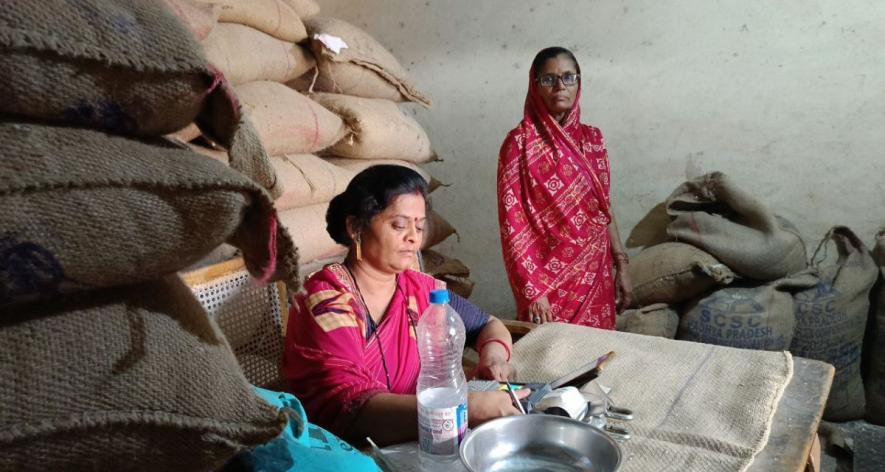
Women led ration shops have been operating for about a year now (Photo - Sharik Akhtar Durrani, 101Reporters).
A boost in confidence
For many women, stepping into the role of PDS shopkeepers was not without a challenge. But over time, with training and support, their confidence has grown and so has their independence.
Usha Sandeep Patil (30) who operates the ration shop in Hingna village panchayat of Khaknar block said: “Initially, I faced problems in operating the point-of-sale machine, but with training now I can do the work easily.”
“I get Rs 10,500 a salary of which Rs 2,000 is paid as shop rent. The government should make arrangements so that we don’t have to pay the rent out of our own pocket,” she said.
Patil is part of the “Jai Jai Raghuveer Samarth Mahila Self-Help Group” in Hingna. She said that since the women’s group took over the shop, more women from the village have begun visiting to collect ration. “Earlier, they never went when male salesmen were in charge,” she said.
Patil’s story mirrors that of several other women across the district. In Mehl Gurada village, Sayra Tadvi of the “Sabka Malik Ek” SHG recalled how nervous she was at first. “Now it has become a habit,” she added.
Sayra manages supplies for 492 ration cardholders and distributes around 50 quintals of wheat and 75 quintals of rice, along with salt and sugar, each month.
When this reporter met her, she was on her way to attend a meeting called by the Sub-Divisional Magistrate (SDM) in Nepanagar—an example of how her new role involves not just distribution but regular engagement with district administration.
Even as the honorarium is modest, most women said it helps ease their family’s financial burden not just for herself but for her SHG.
Rathore said that of the Rs 10,500 she earns for managing the shop, she keeps Rs 5,000 with herself and the rest she voluntarily deposits into her SHG’s bank account. Whenever any member needs funds, money is withdrawn from this account for them. Rathore also withdraws money from this account when she needs funds herself.
Shaila Suryanvanshi from Adgaon added that her honorarium helps with the household expenses and also gives her a sense of purpose. “I open the shop for three hours in the morning and again three in the evening.”
“Out of the Rs 10,500, I pay Rs 1,500 as shop rent. From the remaining Rs 9,000, I give half, Rs 4,500to another group member who helps with weighing the grains. If the government could waive or pay the shop rent, it would be a huge relief for us,” she added.
While the initial months offered no breaks, they now manage to take a day off each week.
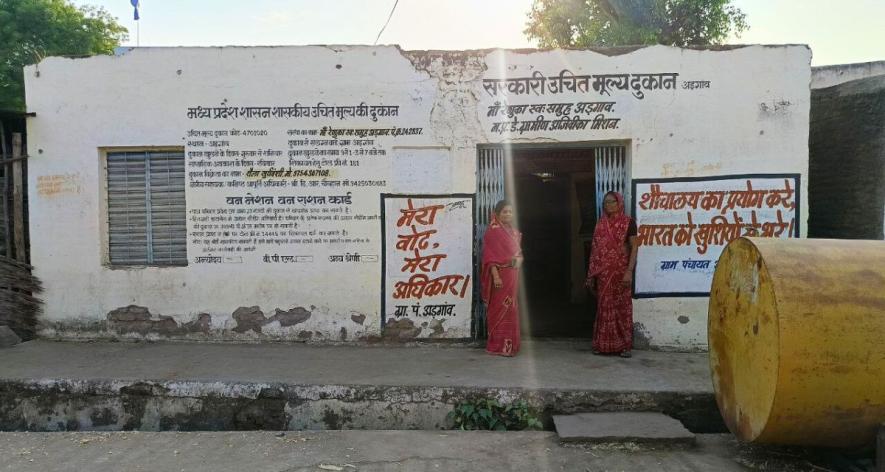
Outside the ration shop in Burhanpur (Photo - Sharik Akhtar Durrani, 101Reporters).
Ease of operations
“These women open the ration shop regularly and understand everyone’s problems. That’s why the women in the village are happy,” said Jija Bai Suryavanshi of Selgaon.
She noted a sharp rise in the number of women coming to collect rations—something that rarely happened before. “Earlier, only men would come. Now, women, daughters-in-law, and even young girls are showing up,” she added.
Suryavanshi said that earlier the shop operated only three days a week. “It often shut by the 20th of the month, which would cause inconvenience to us,” she said.
According to Archana Nagpure, the success of these shops is measured by 100% grain distribution to beneficiaries, over 90% e-KYC compliance, and zero complaints.
Looking ahead, however, Nagpure said that the operations might become more complex if the current provision of free grains, under the Pradhan Mantri Garib Kalyan Anna Yojana, ends. When beneficiaries are required to resume payments for subsidised foodgrains, shop operators will need to manage cash transactions, maintain financial records, and ensure timely bank deposits. It will require additional training and preparation to ensure that the smooth functioning continues as responsibilities expand.
Sharik Akhtar Durrani is a freelance journalist and a member of 101Reporters, a pan-India network of grassroots reporters.
Get the latest reports & analysis with people's perspective on Protests, movements & deep analytical videos, discussions of the current affairs in your Telegram app. Subscribe to NewsClick's Telegram channel & get Real-Time updates on stories, as they get published on our website.










